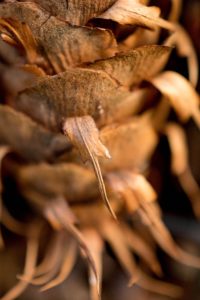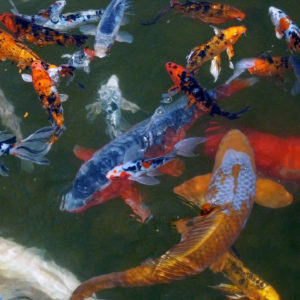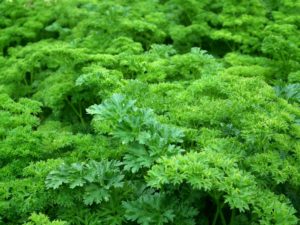Top Tips for Beginning Hydroponics
Want to know the top tips for beginning hydroponics? This is what it’s all about.
Growing with hydroponics means you can grow plants all year long in the comfort of your home, and better yet, you get better results than in soil. Hydroponics is known to give plants increased yields, quicker growth, and ultimately a better end product (assuming you do it right, of course).
So, if you want all these benefits, you need to know how to properly operate a hydroponic garden. If you’re just starting your research, it might seem like hydroponics is overwhelming. You’re sitting here thinking, “I’m not a scientist, how can I make this work?”
Well, scientist, farmer, chemist, or no, it’s easier to create a hydroponic garden than you might think. Trust us, we’ve been there, and we know it’s entirely possible to become a successful hydroponic gardener, no matter what your experience is. If you’re ready to take the leap, then these top tips for beginning hydroponics are exactly what you need to get off to a good start.
 What is Hydroponics?
What is Hydroponics?
Everyone knows about the typical version of gardening- you plant your seeds in the soil, water them, prune them, and basically hope for the best. With hydroponics, you don’t have to just hope for the best, you have enough control over the environment to make it the best.
What is hydroponics?
Hydroponics is the practice of growing plants without soil, in mostly water based systems. For stability, as well as nutrient and moisture retention, some hydroponic systems use a non-soil
growing medium (like perlite, rockwool, or clay pebbles). Sometimes hydroponics is also called water culture.
The Best Tips for Beginning Hydroponics
The easier the better (at first)
Hydroponic systems can get just about as complicated as you’re willing to make them. However, it’s best to save the complex systems for more seasoned pros. When you’re first beginning hydroponics, a simple system can help you start on the right foot. And it can teach you a lot about how hydroponics works.
Learn more about the different types of hydroponic systems.
When you choose the hydroponic system you want to start with, remember the more moving parts, the more complex it is. One type of hydroponic system without any moving parts is a wick system. Other good options for beginner’s hydroponic systems are DWC (deep water culture) and drip systems.
You can also try another method for water culture: the Kratky method. This system works a lot like DWC. But, you don’t change out any water, and you can only use it for one crop cycle.
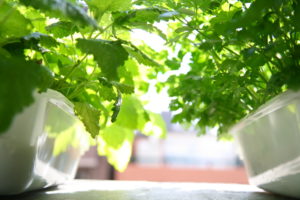
Make it easy on yourself from your first system to your first crops.
Get a system that’s easy to operate and maintain, and grow easier plants at first. Plants like leafy greens are some of the easiest you can grow. Learn about the best easy plants for hydroponics.
Some easy hydroponic plants we recommend are:
- Chard
- Basil
- Lettuce
- Kale
- Spinach
Small now, big later
There’s nothing wrong with starting your hydroponic system with a few plants at first. In fact, it’s one of the best ways to start learning about successful hydroponic gardening. Hydroponics is exciting, and it’s all too tempting to start building a huge system with its own grow room. We’re big fans of large hydroponic gardens, but the more plants you get, the more complicated it is. Not only that, with every plant you add, you also add more to your workload.
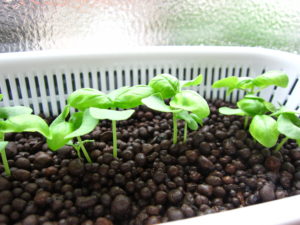 Once you get through a successful grow with only a few plants, you can start moving up to more plants. You can even start beginning hydroponics with just one or two plants. It allows you to dedicate all your attention to them, and see what you need to do.
Once you get through a successful grow with only a few plants, you can start moving up to more plants. You can even start beginning hydroponics with just one or two plants. It allows you to dedicate all your attention to them, and see what you need to do.
You don’t need to make a big investment. You can do something as simple as growing a single head of lettuce in a Kratky system to start your hydroponic garden.
With a small system, and a small number of plants, you can learn to examine your plants, and correct your mistakes along the way. If you notice problems that appear as a result of a nutrient solution, excessive light, or pathogens, it’s much easier to diagnose and correct with only a couple plants.
Then, when you have a lot more plants in your system, you’ll have a better foundation to fix your mistakes.
Take time to correct mistakes
What’s one of the most important tips for beginning hydroponics? Don’t get discouraged when you make mistakes. It happens to even the most experienced growers. One mistake doesn’t necessarily mean you need to throw out your entire crop. In fact, you can fix a lot of problems if you notice them early on and take the correct action.
Just because your plants look ill, droopy, discolored, or anything else doesn’t mean you can’t fix it. Learn more about the most common problems in hydroponics (and how to fix them).
There’s not a one size fits all solution for every symptom your plants might show. However, going through the work of fixing them gives you more power to fix any issues that come up in the future.
Some symptoms show up on plants and they can indicate several different things. For example, wilting leaves. Wilting leaves can indicate a nutrient deficiency, incorrect watering schedules, or lighting that’s too intense (or the wrong type of light). To figure out what the problem is, you have to pay close attention to your plants, and the environment you put them in.
More information about symptoms of nutrient deficiencies and toxicity here.
Get your information beforehand
Okay, we’ve mentioned that you learn a lot about hydroponics as you begin growing hydroponically. However, there are a ton of things you should know beforehand. We’re not saying you need to become an agricultural expert. You just need to know how to maintain your system, how to clean it, how to take care of the plants you plan on growing, and the like.
Some of the basic things you should know are:
- How your system works
- How to maintain and clean your system
- How to do regular water changes
- How testing your system works
- What kind of lighting you need
- Environmental requirements for your plants
- Nutrients needs for your plants
- What kind of growing medium to use
There are plenty of sources of information you can use to get started, and we suggest our Guides as a resource. We have everything you need to know whether you’re beginning hydroponics or you’ve been doing it a while and you’re ready to dig deeper.
Of course, you don’t have to know everything ahead of time. However, you should have a good grasp of the basics. Don’t be afraid to network with other hydroponic gardeners and look for more information if you’re not sure.
Figure out your nutrients
Nutrients are one of the keys to success in hydroponics. It’s really one of the ways that hydroponics excels above soil growing, because there’s very little to inhibit plants’ nutrient uptake. Just make sure you know what kinds of nutrients your plants need.
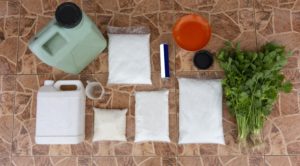
While leafy greens and vegetative plants can use the same nutrient formula for the majority of their growth, the same can’t be said for flowering and fruiting plants.
If you’re growing plants like tomatoes or strawberries, you need to change their nutrient formula once they’re ready to begin flowering. The nutrients you give them at the beginning will have much more nitrogen. The nutrients you give them as they mature should have more phosphorus and potassium. Nitrogen, phosphorus, and potassium are all the major components in the NPK ratio.
Now, a lot of people beginning hydroponics think that nutrients are expensive, and nearly cost prohibitive when they want to start their garden. That’s really not the case. While you’ll spend more on nutrients than some other daily components of your system, you don’t need to break the bank. You can even try DIY nutrient solution formulas to cut even more on costs (and give yourself a little more experience).
Examine your plants (and your system)
If you want to prevent big problems, check for them every day and find them when they’re still small problems. It only takes a couple days for plant pathogens or pests to spread throughout your hydroponic system and take your entire crop out. Luckily, most problems are (somewhat) easily fixed when you catch them early on. At the most, you might lose some leaves, or a plant or two.
If an issue continues without treatment, it spreads from plant to plant in very little time.
Make checking your system and your plants at least once a day a priority. Check your EC (nutrient concentration), pH levels, and water levels to keep your hydroponic system in good shape. When it comes to your plants, start at the bottom and work your way up. Look for any discoloration, abnormal dark spots, wilting, curling, or signs of pests.
A wilting plant isn’t necessarily a reason to remove it, but small webs, discolored spots on leaves, or shiny black dots can indicate a pest infestation that can spread throughout your garden.
Dive in
We’re all about doing the right research and preparations before you start your hydroponic garden. That’s what these tips for beginning hydroponics are about. While you should get the basics down, experience can be the best teacher. There are endless things you might never think to research and learn until you come across them in practice. And if even you do read stacks upon stacks of books about hydroponics, hearing and reading about it isn’t the same as going through it.
Don’t be afraid of making mistakes and failing on a crop or two (or even more than that). Do your best with the knowledge you’re equipped with, and use that to guide the start of your hydroponic project. Still, just know that hydroponics, like any other new skill, requires both patience and practice.
A garden isn’t grown overnight.
Find the hydroponic system you can manage, gather your equipment, and start with easier plants you can grow. Start learning along the way, and you can expand your hydroponic garden, as well as the selection of plants you want to grow.
Resources to Help You Get Started
Now that you have our top tips for starting hydroponics, we’ll help you get a little further along in the process. We talk a lot about doing research and finding the right resources, so it’s only right that we give you a good starting point.
Yes, our beginner’s guides to hydroponics section is a great place to start. However, if you really need the bare bones version of the essential guides, try these. We recommend starting with these and working your way through the rest of our guides or searching by topic to find the information you need.
- What is hydroponics? – An introduction to what exactly hydroponics is, and how it differs from traditional agriculture
- The easiest plants for hydroponics – In our ‘Best Plants for Hydroponics Series’ we detail the easiest (and best) plants for beginners
- Hydroponic systems and how they work – Learn about the different types of hydroponic systems (with helpful diagrams) so you can pick the right one to start with
- Hydroponic system maintenance – Learn how to take care of your hydroponic system and the plants in it
- NPK and nutrient solution – The basics of feeding your plants and understanding the nutrients they need
- Hydroponic growing medium – What do you use instead of soil? Growing media, and everything you need to know is right here.
- Common problems in hydroponics – We talk about some of the most common problems in hydroponics, and what you can do to correct them
- Basic hydroponic system equipment – Here are the basic components you need for each type of hydroponic system
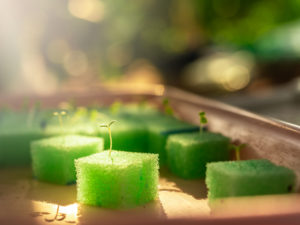 What is Hydroponics?
What is Hydroponics?